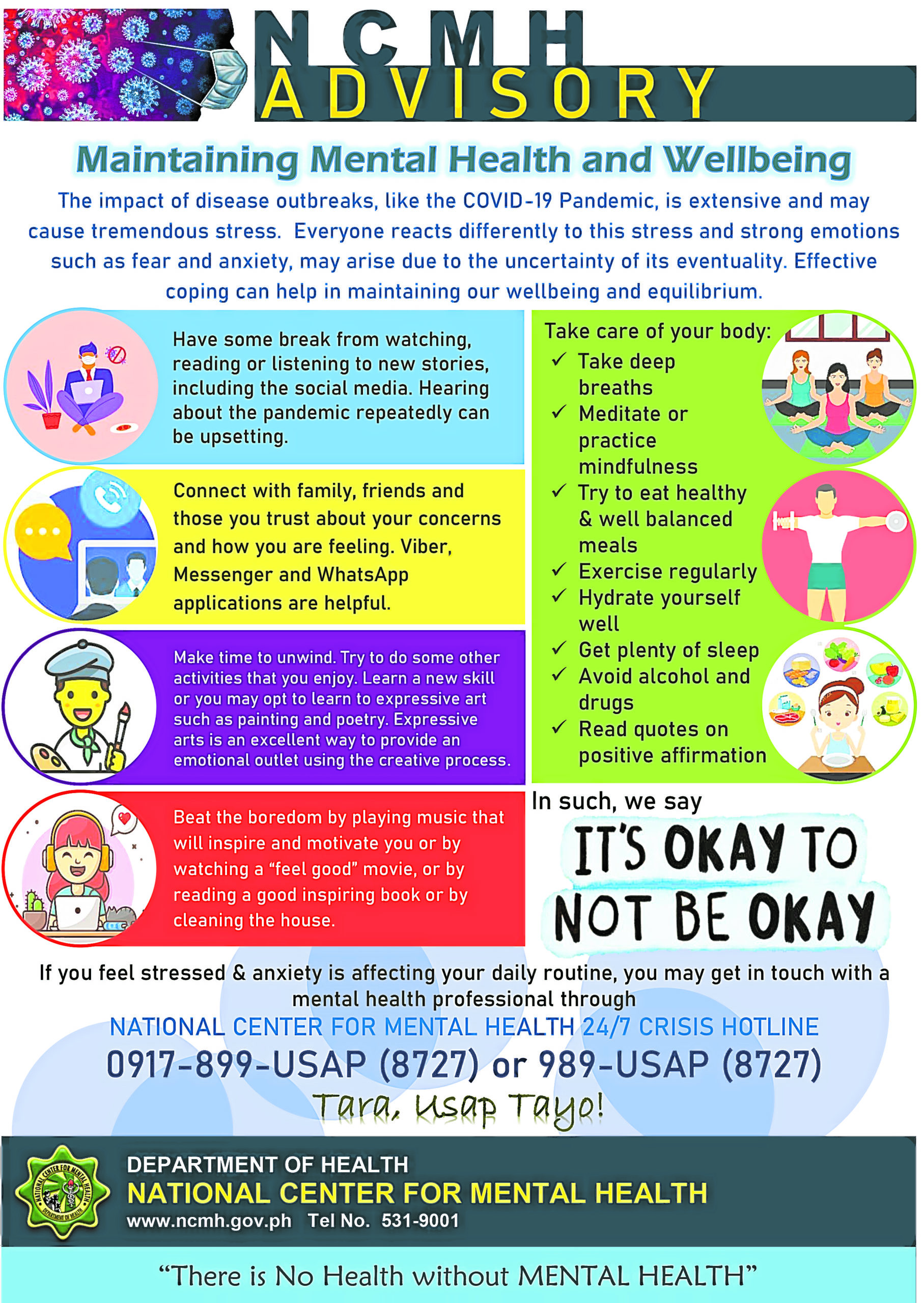Pandemic of despair: Calls swamp PH mental care hotline

IT’S OK On its website, the National Center for Mental Health (NCMH) is advising Filipinos on howto deal with stress and anxiety overCOVID-19 by,among other things, avoiding repeated exposure to reports on the pandemic, sharing concerns with family and friends,meditating and exercising, learning newskills and playing inspirational music.The NCMH has been bombarded by numerous calls frompeople seeking help inmaintaining their mental health.
The number of Filipinos who said they were suffering from depression or were gripped by anxiety since the government placed many parts of the country under quarantine had increased fivefold and they had “bombarded” the National Center for Mental Health (NCMH) with hundreds of calls for help, the center’s medical chief said on Thursday.
Before the restrictions that had kept most people in their homes to prevent the spread of the new coronavirus disease (COVID-19) since mid-March, the calls received by the center’s hotline numbered only around 60 to 80 monthly, according to NCMH Director Roland Cortez.300 to 400 calls
“When we started to have this lockdown, we had 300 to 400 calls per month, meaning to say that there are a lot of people wanting to communicate with the experts that we placed in the crisis hotline, that actually were mostly due to anxiety and depression because of the quarantine lockdown that has been going on,” he said at a Senate hearing.
The NCMH hotline is 0917-899-USAP (8727) or 7-989-USAP (8727).It was mandated by the Mental Health Act and launched in 2019 to provide assistance to anyone grappling with a mental health crisis, including those at risk of suicide.
The hotline responds to all queries on issues related to mental health, provides information and initial counseling if necessary, and assessment prior to any referral to a mental health professional or facility.
Article continues after this advertisementOFW assistance
Aside from the crisis hotline, the NCMH also provides support to the Overseas Workers’ Welfare Administration in evaluating overseas Filipino workers (OFWs) who experience some degree of mental problems, Cortez said.
Article continues after this advertisement“We can safely say, based on our existing data, there are a lot of problems being experienced by our people due to this lockdown,” he said.
Many of the OFWs eager to return to their families are stressed by their quarantine, which sometimes extended beyond the prescribed 14 days due to delays in the release of the results of their tests for SARS-CoV-2, the virus that causes COVID-19.
Psychiatrist June Lopez said that in her many years at the Philippine General Hospital, she had handled OFWs who had returned home not only depressed but also suicidal.
Compensation
Lopez said one repatriated worker committed suicide while in quarantine.
Cortez said he supported a bill to amend the Mental Health Act to provide immediate compensation or financial assistance that persons with mental health conditions are entitled to under existing laws if they developed work-related temporary or permanent mental disability.
He said the proposed law should not place the burden of proving the cause of the mental health problem on the person suffering from the ailment.
It should also not preclude the provision of compensation and sustained access to mental health services and medicines.
Cortez proposed that mental health workers also receive hazard or risk pay.
PTSD case
The bill was filed by Sen. Sonny Angara, who cited the case of retired Army soldier Winston Ragos, who was suffering from post-traumatic stress disorder (PTSD) when he was shot by a policeman who accused him of violating quarantine rules last month in Quezon City. Ragos died hours later in a hospital.
Angara noted that the ex-solider was unable to take his regular medication because of quarantine restrictions.Lopez, for her part, said the specific mental health problem must be well-defined. But determining whether it is work-related could be contentious, she added.Usually, the doctors or mental health professionals making the assessment or diagnosis are connected with the employer or insurer, resulting in a conflict of interest, Lopez said.
She also said employees may fear reprisal for claiming they had developed mental health problems at work.
Word of caution
Jaime Almora of the Philippine Hospital Association advised caution in the identification of mental disorders.
Almora said the mental health problems to be compensated should be specified to avoid abuse.
He said students under a lot of stress, such as those in the Philippine Military Academy, may seek compensation for temporary mental problems.
Employees who do not want to report for work could claim mental conditions due to stress as well, Almora added.